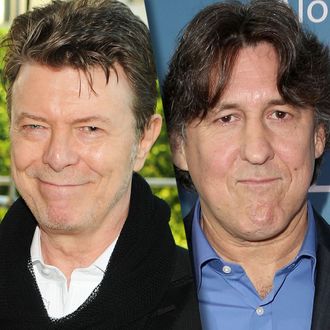
One night when Cameron Crowe was 16 years old, he was sitting in his bedroom in San Diego when he got a phone call. It was David Bowie, who was on a train to Los Angeles from New York City, and he was inviting the budding journalist to meet him for an interview. Crowe, now an Oscar-winning director, didn’t believe it would actually happen, but Bowie did follow up two days later, saying, “Let’s meet and let’s spend time together.” (Bowie had heard of Crowe through musician friends Crowe had interviewed.) “He was the most generous and exciting interview subject that I was ever allowed a lot of time with,” said Crowe, who remembered the late musical icon while promoting his TV series Roadies at the Television Critics Association press tour in Pasadena. “And that all came from David Bowie.”
That first interview lasted six months, Crowe said. “Basically, I was in this whirlwind with him in a period between Young Americans and Station to Station. Thank goodness, I kept notes on every aspect of it and there were no limits. Everything was discussed — he said, ‘Ask me anything, watch me create, watch me produce, watch me sad, watch me happy.’ And it was an incredibly vital experience because he said, you can do this story for whoever you want. Everybody wanted the story. It was a great help to my career then. But the amazing thing I came away [with] then — which was a wild period in his life, he was always obsessed with music and art.” Crowe would interview Bowie many times over the years for Rolling Stone, Playboy, and Creem.
Bowie, Crowe recalled, would reach out to young artists who moved him. One of those was Bruce Springsteen, shortly after the release of Springsteen’s first album. “He was talking about Bruce Springsteen in the early stages of Bruce Springsteen’s career,” and that was his true legacy, Crowe explained.
“David Bowie’s impact is so huge in that he presents himself as a role model to artists that may need to remember that it’s not about branding — it’s about a restless need to be creative and to continue being creative,” Crowe said. “David Bowie was the anti-branding artist. And for a young musician, or artist, or anybody coming up, it’s great to look at Bowie and see that side of him. Not because he kept doing the same thing that worked again and again but because he always shook it up and he always served the God of creativity. That was the lesson I learned from him then.”

